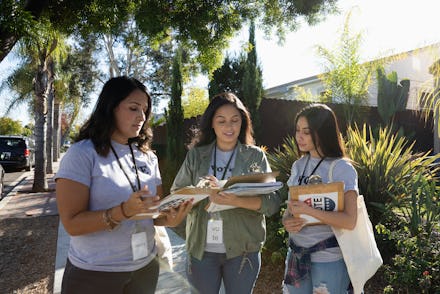Millennials helped deliver a "blue wave" in 2018. Here's where they stand on 2020

Millennials were crucial in the 2018 midterms that everyone called a "blue wave," but key polls of millennial voters show the 2020 election won't be as easy to predict. With a still-crowded Democratic primary field and Donald Trump's roller coaster of a presidency, there's only so much that polls can tell us a year in advance. That being said, the top polls do offer some major takeaways about what to expect from young voters.
According to a national poll from Quinnipiac University from just before the fourth debate in October, the top candidates for voters ages 18 to 34 were Vermont Sen. Bernie Sanders, with 31%; Massachusetts Sen. Elizabeth Warren, with 30%, and South Bend Mayor Pete Buttigieg, with 12%. Eight percent of millennial voters are still undecided.
And when it comes to what millennials think of the candidates overall, a September NPR/PBS NewsHour/Marist poll measured whether respondents had favorable or unfavorable impressions of the candidates and then looked at each generation's response. According to the results, 50% of Gen Z and millennials (ages 18 to 38) across the political spectrum had a favorable impression of Sanders, compared to Warren's 44%, Vice President Joe Biden's 37%, and California Sen. Kamala Harris's 25%. But when narrowing it down to Gen Z and millennials who are Democrats or Democratic-leaning independents, Warren boasted a 75% favorability rating, while Biden had 71%, Sanders had 66%, Harris had 56%, and Buttigieg and New Jersey Sen. Cory Booker each had 52%.
But favorability rankings and the top candidates change depending on what poll you look at — and, sometimes, what month it is.
J. Ann Selzer, president of the Iowa-based polling firm Selzer & Company, notes that the opinions of young voters can be tough to pin down. A recent CNN/Des Moines Register/Mediacom poll of likely Iowa caucus-goers, which Selzer’s company conducted earlier this month, showed that Sanders was leading as the first choice for voters under 35, with Buttigieg coming in second. But in a CNN/Des Moines Register/Mediacom poll the firm conducted just two months earlier, Warren was at the top of the leaderboard for young voters.
“I’m not going to say they’re fickle, but they’re a moving target,” Selzer tells Mic.
According to a fall 2019 youth poll from the Institute of Politics at Harvard Kennedy School (which had the top three candidates as Sanders, Warren, and Biden, respectively), integrity is the top attribute voters ages 18 to 29 are looking for in a candidate. Young voters are also a bit torn between pragmatic and progressive policy plans, but more than not, they support dismantling the Electoral College, eliminating private health insurance in favor of health care coverage from the federal government, and instituting background checks and assault weapon bans.
The November Quinnipiac poll found that while many millennial voters (36%) are paying “some” attention to the 2020 campaign for president, just 30% are paying “a lot” of attention, the lowest percentage of any age group. Twelve percent said they are paying no attention at all. The Harvard Youth Poll, however, found that 47% of voters under 30 are "following news about national politics closely."
It's all about what will actually happen on Election Day, though. The Harvard Youth Poll found that 57% of voters under 30 said they will "definitely" show up to vote, and according to analysis by the Pew Research Center, millennials helped contribute to a record voter turnout in the 2018 midterms, with millennials and Gen X casting 21.9 million more votes in 2018 than they did in 2014. That trend is expected to continue, with analysts expecting yet another record-high turnout in 2020.
Selzer says that compared to 2016, when there were only two serious Democratic presidential candidates, younger likely caucus-goers in Iowa — where the election officially begins — are now more likely to describe their support for their first-choice candidate as extremely enthusiastic. “So there’s a sense that they’re fired up,” she says.
And at least one thing is clear: Most young voters won't be choosing Trump. In the NPR/PBS NewsHour/Marist poll, 34% of Gen Z and millennials said they would vote for Trump for re-election, while 58% said — without even knowing who the Democratic candidate will be — they would "definitely" vote against him.